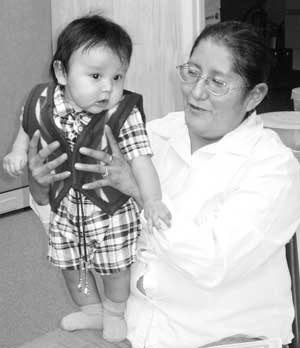Benefits of breastfeeding in workplaces touted
By Marley Shebala
Navajo Times
WINDOW ROCK, Jan. 26, 2012

(Times photo - Marley Shebala)
The Fort Defiance Women, Infants and Children Program held a "retirement" luncheon Jan. 13 for six-month-old Christopher Nez, held by his mother, Ora Nez.
And 6-month-old Christopher should because six months ago he began going to work at the WIC office in a cradleboard with his mother, Ora Nez, thanks to the Navajo Nation Healthy Start Act of 2008.
The Healthy Start law allows a tribal employee to take her newborn baby to work with her if she is breastfeeding.
The law references the documented benefits of breastfeeding - significantly reduced infant illness and strengthened immune systems, as well as increased job productivity and satisfaction for moms, as both parents use less of their sick leave caring for an ill baby, and have lower health care and insurance costs.
The law defines "infant" as a child between birth and 12 months and mandates that a breastfeeding mother be provided "a clean and private area or other enclosure near the employee's workspace, and not a bathroom, to allow a working mother to engage in breast-feeding or use of a breast pump."
The law does not require the employer to pay the employee for time spent on breastfeeding breaks, but says the employer is liable for sanctions by the Office of Navajo Labor Relations if a break area is not provided as specified in the law.
Nez, who is the Fort Defiance WIC breastfeeding counselor, said WIC employees are allowed to bring their infants to work with them for the first six months. In other workplaces, the mother must arrange for someone to bring the baby in to be fed, often more than once in the workday, or pump and store her milk during breaks.
Christopher's last day at the Fort Defiance WIC office was Jan. 13. The staff held a "retirement" luncheon for him that included a certificate of appreciation and recognition for his "outstanding teamwork, morale building, positive attitude and going above and beyond in delivering quality smiles and coos."
As staff ate a potluck of Mexican food and a Winnie the Poo cake, they chatted about how much they would miss his laughter and presence.
Program Manager Adele King, who attended Christopher's retirement luncheon, noted that not all co-workers of breastfeeding employees are as supportive as this group.
King, who has served as the WIC program manager for the past 23 years, said about 30 WIC workers have taken advantage of the Healthy Start law, but she did not know how it was going in other tribal programs.
Without the law, many women felt intimidated about asking their supervisors for time and space to continue breastfeeding after returning to work, and as a consequence many infants did not receive breast milk before the pediatrician-recommended time of six months to a year after birth, according to information provided to the Navajo Nation Council when it deliberated on the law.
Baby gooroos, a national organization giving advice on raising infants, heralded the Navajo Nation law as "good news."
King remembers telling staff at the Division of Health, where her office is located, that they only had to tolerate the cries of a hungry infant for the few minutes it took the mother to get breast and baby together.
The staff eventually got used to the routine, she added.
"I've always promoted breastfeeding because it decreases ear infection and other childhood diseases, but most importantly it creates a bond between the mother and child," King said.
The bond is more than sentimental, according to the science behind breastfeeding, and is the result of hormones that stimulate nurturing and attachment instincts.
King noted that breastfeeding is also less expensive than baby formula, which can cost $40 a week, or about $2,000 over the course of the baby's first year, according to various healthy baby Web sites.
King said her staff works with the Navajo Reservation's hospitals to promote breastfeeding through the Baby Friendly Hospital Initiative, which is sponsored by the World Health Organization and United Nations International Children's Emergency Fund.
According to the WHO and UNICEF, the initiative is a global program that helps hospitals and birthing centers give mothers the information, confidence and skills needed to breastfeed.
The agencies state that more than 1 million infants worldwide die annually because they are not breastfed or are given other foods before their digestive systems are mature enough.
"A decreased risk of diarrhea, respiratory and ear infections, and allergic skin disorders are among the many benefits of breastfeeding to infants in the industrialized world," the organizations stated. "For diarrhea alone, approximately 200,000 U.S children, most of whom are young infants, are hospitalized each year at a cost of more than half a billion dollars."
Fort Defiance WIC breastfeeding peer counselor Amanda Singer said the hospitals in Chinle, Crownpoint, Fort Defiance, Gallup, Shiprock and Tuba City are all designated as "baby friendly" for their proactive stance towards breastfeeding.
According to Singer, no other hospitals in Arizona and New Mexico have received the designation.

